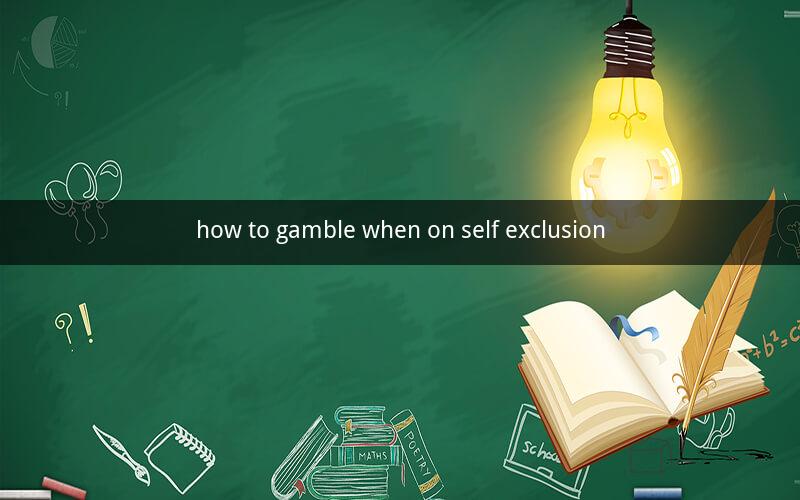
Directory
1. Introduction to Self-Exclusion
2. Understanding the Importance of Self-Exclusion
3. The Risks of Gambling During Self-Exclusion
4. Recognizing the Signs of Relapse
5. Strategies for Preventing Relapse
6. Legal Consequences of Breaching Self-Exclusion
7. Support and Resources for Gamblers in Self-Exclusion
8. Alternatives to Gambling During Self-Exclusion
9. Case Studies and Success Stories
10. Conclusion
1. Introduction to Self-Exclusion
Self-exclusion is a formal agreement between a gambler and a gambling establishment to refrain from participating in gambling activities. This agreement is often legally binding and can range from a few months to a lifetime. While self-exclusion is designed to protect individuals from the harmful consequences of gambling, it is important to understand how to gamble responsibly even when under such an agreement.
2. Understanding the Importance of Self-Exclusion
Self-exclusion serves several important purposes:
- It provides a clear and concrete boundary for individuals who are struggling with gambling addiction.
- It offers a structured approach to overcoming addiction, allowing individuals to take control of their actions and choices.
- It provides peace of mind to individuals and their loved ones, knowing that the gambler is actively working to overcome their addiction.
3. The Risks of Gambling During Self-Exclusion
Despite the intentions behind self-exclusion, it is not uncommon for individuals to engage in gambling activities during the exclusion period. This can be dangerous for several reasons:
- It can lead to a relapse, making it even more challenging to overcome the addiction.
- It can cause financial, emotional, and legal consequences for the individual.
- It can strain relationships with loved ones who may be supportive of the individual's efforts to overcome their addiction.
4. Recognizing the Signs of Relapse
Identifying the signs of a relapse is crucial in preventing further harm. Some common signs of a relapse include:
- Feeling an overwhelming urge to gamble
- Increased feelings of guilt or shame
- Difficulty in managing emotions
- Increased anxiety or depression
5. Strategies for Preventing Relapse
To prevent relapse, individuals in self-exclusion should consider the following strategies:
- Identify and avoid triggers: Recognize the situations or emotions that make you want to gamble and create a plan to avoid them.
- Seek support: Reach out to friends, family, or professionals who can provide guidance and support during the exclusion period.
- Develop alternative hobbies: Engage in activities that occupy your time and provide enjoyment without the risk of gambling.
- Set clear boundaries: Establish strict rules and limits to prevent the temptation to gamble.
6. Legal Consequences of Breaching Self-Exclusion
Breaching self-exclusion can have severe legal consequences. Depending on the jurisdiction, penalties can include fines, imprisonment, and other legal actions. It is important to adhere to the terms of your self-exclusion agreement to avoid these repercussions.
7. Support and Resources for Gamblers in Self-Exclusion
Seeking support and resources can greatly improve your chances of overcoming addiction. Some useful resources include:
- Counseling services: Seek professional help from a therapist or counselor specializing in gambling addiction.
- Support groups: Attend support group meetings where you can connect with others who understand your struggles.
- Online resources: Utilize online forums and websites dedicated to helping individuals with gambling addiction.
8. Alternatives to Gambling During Self-Exclusion
Finding healthy alternatives to gambling can help pass the time and reduce the temptation to relapse. Some popular alternatives include:
- Physical exercise: Engage in activities like running, cycling, or yoga to keep yourself active and focused.
- Learning a new skill: Take up a new hobby, such as painting, cooking, or playing an instrument.
- Volunteering: Offer your time and skills to a cause or organization that needs assistance.
9. Case Studies and Success Stories
Several individuals have successfully overcome their gambling addiction through self-exclusion. Their stories can serve as inspiration and motivation for others facing similar challenges. These case studies highlight the importance of commitment, support, and perseverance in overcoming addiction.
10. Conclusion
Self-exclusion is a powerful tool for individuals struggling with gambling addiction. By understanding the importance of self-exclusion, recognizing the risks of relapse, and implementing effective strategies to prevent relapse, individuals can successfully overcome their addiction. Remember, seeking support and resources is crucial in this journey towards a healthier, happier life.
Questions and Answers
1. What is self-exclusion?
Answer: Self-exclusion is a formal agreement between a gambler and a gambling establishment to refrain from participating in gambling activities for a specified period of time.
2. Can I break my self-exclusion agreement?
Answer: Yes, you can break your self-exclusion agreement, but doing so can have severe legal consequences.
3. How can I identify the signs of a relapse?
Answer: Signs of a relapse include overwhelming urges to gamble, increased feelings of guilt or shame, difficulty in managing emotions, and increased anxiety or depression.
4. What are some strategies to prevent relapse during self-exclusion?
Answer: Strategies to prevent relapse include identifying and avoiding triggers, seeking support, developing alternative hobbies, and setting clear boundaries.
5. What legal consequences can I face for breaching self-exclusion?
Answer: Legal consequences for breaching self-exclusion can include fines, imprisonment, and other legal actions, depending on the jurisdiction.
6. Can I seek professional help while under self-exclusion?
Answer: Yes, seeking professional help, such as counseling or therapy, can be beneficial during self-exclusion.
7. Are there support groups available for individuals in self-exclusion?
Answer: Yes, there are support groups and online forums available for individuals in self-exclusion to connect with others facing similar challenges.
8. What are some healthy alternatives to gambling during self-exclusion?
Answer: Healthy alternatives to gambling include physical exercise, learning a new skill, and volunteering.
9. Can self-exclusion help me overcome my gambling addiction?
Answer: Self-exclusion can be an effective tool for overcoming gambling addiction when combined with other strategies, such as seeking support and engaging in healthy activities.
10. Is it possible to gamble responsibly while under self-exclusion?
Answer: It is difficult to gamble responsibly while under self-exclusion, as the agreement is designed to protect individuals from the harmful consequences of gambling.